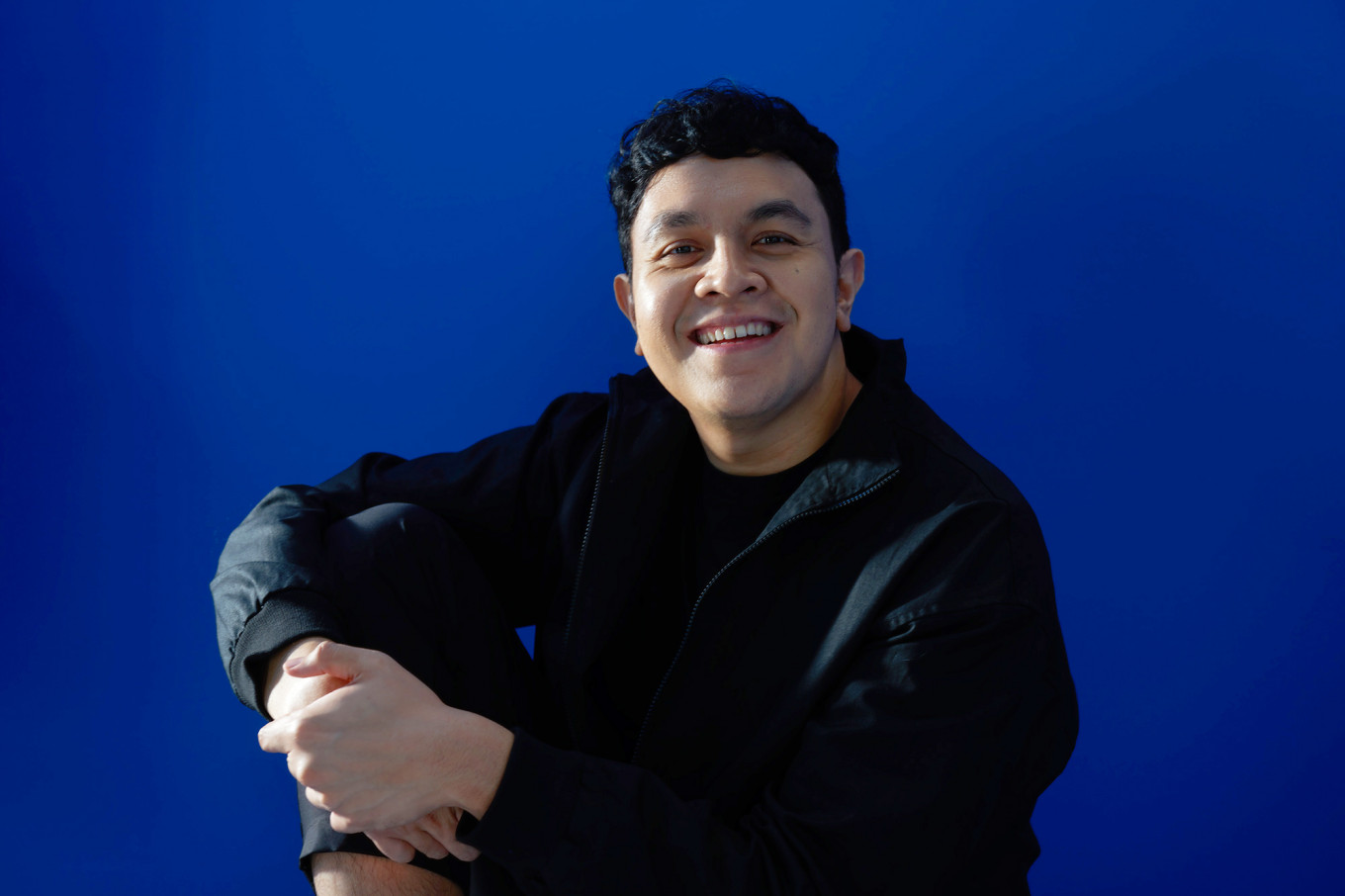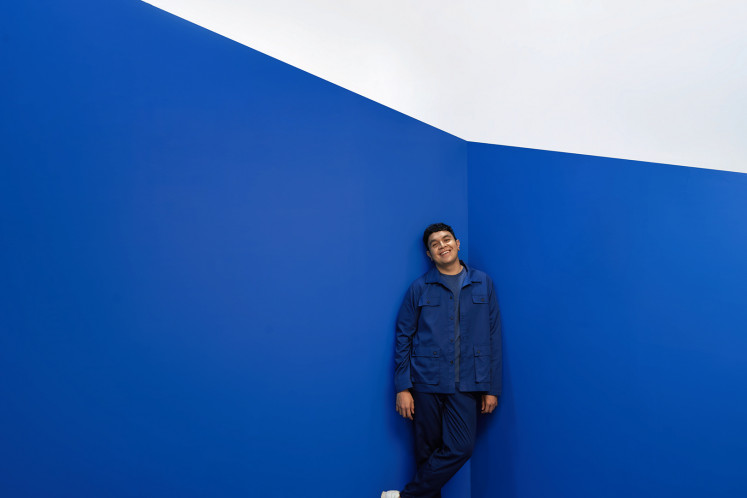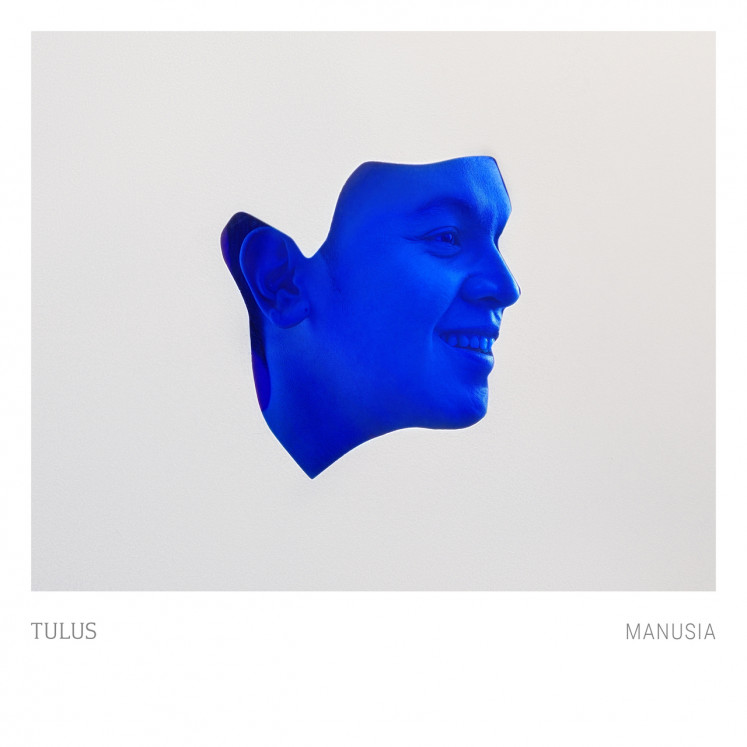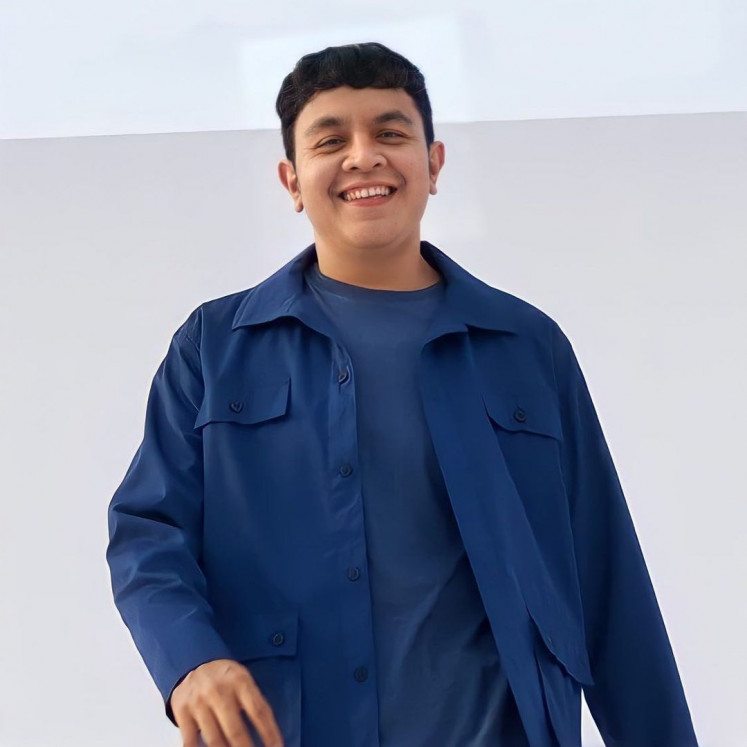Popular Reads
Top Results
Can't find what you're looking for?
View all search resultsPopular Reads
Top Results
Can't find what you're looking for?
View all search results20 questions with Tulus
Change text size
Gift Premium Articles
to Anyone
'20 questions’ is a new Q&A column in which we talk to the country’s most intriguing individuals — from artists, celebrities, academics and activists to leaders, industry players and ‘regular’ people with notable achievements.
Singer Tulus released his fourth full-length album of original songs (his fifth album overall) titled Manusia (Human) on March 3. Three days later, with little marketing fanfare, one of the album's composing tracks, "Hati-Hati di Jalan" (Safe Travels), reached number one on the Spotify Indonesia Top 50 chart. The following day, all of the 10 tracks making up the album occupied the same chart.
On the weekend, Manusia debuted at number three on Spotify's Top Albums Debut Global chart, making Tulus the first Indonesian music act with an album entirely in Indonesian to do so.
Despite being one of the most decorated Indonesian musicians in the game, the 34-year-old singer-songwriter insists that he is still not used to his resounding, record-breaking success.
"Preparing this album was neither a simple feat nor a brief process," Tulus told The Jakarta Post. "That's why it's so heartwarming to see such a response. It made me forget how exhausting the process was."
Answering The Post’s 20 questions, Tulus reflected on his journey of recording Manusia, his fascination with humanity and being a keen observer of life.
Juggernaut: All of the tracks composing "Manusia" have debuted on the Spotify Indonesia Top 50 chart, making it the first Indonesian album to do so. (Courtesy of TulusCompany) (Courtesy of TulusCompany/Courtesy of TulusCompany)How would you compare who you are right now with who you were a decade ago?
I have a wider perspective now — that and being more open-minded as well, creative-wise. My songwriting point of view and my sensitivity toward what kinds of flavors could be molded into songs have become more developed.
When you made your debut, you were considered an underdog because you weren't attached to a major label. Cut to 10 years later and also considering the accomplishments you have had throughout your journey, do you still feel like an underdog in the industry?
I have always believed in myself since day one [laughs]. The confidence here is in the context of making music. I feel like there is a reason why God lent me these talents that I have, so I have faith in that. I believe that my talents are not entirely mine, that they are simply 'deposits', and that's why I'm very confident that such deposits must bear some kind of value. Having said that, I wouldn't get ahead of myself. Anything related to numbers and how many copies are sold and how many people who like my work are different matters entirely. I have never harbored any expectations concerning those things. My focus is purely on how to protect the faith that I have in myself.
You have won more than a dozen Anugerah Musik Indonesia [AMI] Awards, sold out tours over the years and many up-and-coming musicians look at you as their role model. Have you ever felt any pressure to keep things up?
Mmm, no. This is a creative world, so I hope to bring forth good and positive impacts. Nonetheless, it doesn't mean there's an obligation to keep making such an impact all the time [laughs]. Just be a human, you know? No need to feel like, 'If we score 10 today, we must not get 9 tomorrow!'
In 2016 you released Monokrom [Monochrome]. In 2019, you released a live album. This year, you released Manusia. Do you still remember the moment you decided that you were ready to work on Manusia?
I actually started writing new songs when I was promoting Monokrom, but at the time, there was no plan to drop a new album. If asked about the moment or the time window when I felt like, 'Okay, it's time to write songs again [for a new album]!' maybe it was the time leading up to my Monokrom concert [in Jakarta in February 2019]. A few years after that album was released, I started to feel like I could expand my horizon wider than before, that I could open up my heart even more. Like, 'What else can I do?'
Manusia follows a singular emotional theme, which is the highs and lows of being human. What led you to explore this theme?
Here's the truth. When [my collaborators and I] started working on this album, we already had this concept in our subconscious, especially considering who we are as artists. This concept, however, didn't serve as the first step in our exploration. Perhaps it had always been in my subconscious all along — that this is the kind of story I would like to tell. But [during recording] I didn't close my mind off or boxed myself in with that particular concept only. The creative process continued and initially, the themes of the songs did seem 'speckled'. But once we eliminated some songs and looked at the final tracklist, we discovered that perhaps this album might be able to represent the concept in that subconscious, which is humanity.
In your opinion, what is so fascinating about humanity?
Every single human being is unique. From that single sentence alone, there are so many things that we can explore. In a creative world, we need a source of endless ideas because creativity always develops following the development of human civilization itself. Therefore, humans and their boundless distinctiveness seem like a rich reservoir for us as songwriters [laughs].
In Manusia, instead of assuming the role of the main character in a story, you lean more toward being a keen observer of life — yours and others. When you observe the lives of human beings, what is the first thing that catches your eye?
Mmm, this is quite a sweeping question, but if I try to simplify my answer a little bit: I notice how humans share the same basic emotions. I mean, I'm not an expert on humanity, so I couldn't give you a more comprehensive answer [laughs]. To put it simply, we share the same basic emotions: sadness, anger, joy, et cetera. However, it's the stories behind those basic emotions that are unique and infinite. What makes me sad, for instance, is not necessarily what makes you sad as well.
Why did you choose blue as the thematic color for the album's artwork?
The color blue has always been a familiar element in my journey as an artist. For my first album [self-titled, released in 2011], we chose light, cloud-like blue. For my second album Gajah [Elephant, released in 2014], we opted for dark blue. For this album, I spoke with the artwork designer and I asked for a shade of blue that is fresh, but it should still feel familiar.
Human: The cover artwork of Tulus' new album "Manusia", dropped on March 3. (Courtesy of TulusCompany) (Courtesy of TulusCompany/Courtesy of TulusCompany)Ari Renaldi produced your new album and he has been one of your most frequent collaborators for the past 10 years. Can you describe what your creative dynamics are at this point?
We have different life dynamics, but we are both artists. When we regrouped in the studio, we made adjustments with each other. Still, at the end of the day, the album was finished and, as you can see, the different dynamics of our lives prove to shape the album into a satisfactory result. He and I are akin to family at this point. He's my best friend and he's like a big brother to me.
You also invited your prodigy Dere — who won her first AMI Award last year — to cowrite two songs in the album: "Remedi" [Remedy] and "Nala". As someone who has watched over her growth as an artist since day one, what did it feel like working with her, this time side by side?
I felt immensely proud of her. She still has a long journey ahead of her. She has released a few solo numbers with the hope that she will release an album soon. I'm proud that I could play at least a small part in her journey. When we were working on this album, I could say that Dere's contributions were incredibly brilliant. Her ideas were stunning, her young age notwithstanding.
You kicked off the Manusia era by choosing "Ingkar" [Deny] as your first single. Why?
I wanted to have one song that can serve as some sort of both warm-up [for the listeners] and a stepping stone for this new color that was about to kick in. Creatively speaking, I felt that the song "Ingkar" suited best for that purpose.
The song "Ingkar" is also interesting due to its music video treatment featuring an art installation by Bandu Darmawan. How did he get involved in this particular project?
Actually, this song has no music video; what you see is a live performance in front of an art installation. There's a message that I wanted to deliver: that music is a work of art and therefore, any artistic collaboration shouldn't be limited in the form of music alone. Music collaboration should involve other forms of art, such as visual graphic art or cinematography and et cetera. I tried to optimize all kinds of those possibilities.
Speaking of working with artists of different fields, you also recruited photographer and visual artist Davy Linggar for the music video of the album's second single "Tujuh Belas" [Seventeen]. Is there any special reason for his involvement?
I have worked with Davy pretty often, and I feel like our communication has always been effective. What I consider beautiful, he's on board as well. He's always able to execute whatever my visual imagination is. I felt like Davy was the right match for this project.
Besides showcasing a more expansive artistic expression, I also heard that you wished for Manusia to showcase 'the elegance of the Indonesian language', especially considering the whole album was deliberately recorded in said language.
Yes.
Kindness: The release of "Manusia" marked with chart-topping single "Hati-Hati di Jalan" (Safe Travels). (Courtesy of TulusCompany) (Courtesy of TulusCompany/Courtesy of TulusCompany)What drove you to that particular mission?
Indonesian is unlike any other language. For me, the language that we have as Indonesians possesses such a gorgeous tone, it's extraordinary. And when that language is given a melody and wrapped in an elaborate music arrangement, it feels even more captivating. That's what I would like to express through this album. It was a deliberate choice to use Indonesian and I hope I can give a voice to its beauty.
Another beautiful thing that this album conveys is the message of youth as evidenced in the album's opener "Tujuh Belas". How do you personally define youth itself?
It's the feeling of always being able to create something. It's the feeling of always being able to make your move. The spirit of always being productive is not inhibited by age. Everyone grows old. Sooner or later, our hands and our speed will slow down. That said, as long as our soul remains young, no matter how slow we become, we shall always be able to move forward.
And there seems to be a message of peace as well, either peace with others, such as in "Hati-Hati di Jalan" and "Remedi", or peace with oneself such as "Diri" [Self] and "Satu Kali" [Once]. You showcased more mature wisdom with these songs. Where is that wisdom coming from?
It's not something that I either designed or established on purpose. In the life's journey of a songwriter, the songs that they write can serve different purposes. They can be a form of pure self-expression, written documentation of their life, or written documentation of what they see in life. All of those things go by naturally, and perhaps, people can have different perceptions as they interpret such songs. If you see those songs the way you see those things, that's already beyond our control as songwriters. Nothing is ever calculated.
Speaking of documentation of life, the song "Nala" tells a story of a woman named Nala. Who is she exactly?
Mmm, how should I put this [...] Let's just say that Nala is a part of all of us.
Here you are now with a new album and in a new decade. Do you feel like as you have grown older, you have also grown wiser?
There's still a lot I still need to learn. Like, a lot. Everybody has something to learn every single day, though. I'm still learning about songwriting [after five albums]. Honestly, I have never considered myself an expert on songwriting, and I think that would be impossible anyway because [songwriting] is a matter of sensitivity. Songwriting is something that continuously develops, and there's always something to learn.
Let's end this conversation with a fun note: If you could visit yourself from 10 years ago, what advice would you give him?
I wonder [...] I can't think of a better answer than 'be diligent with your exercise!' [laughs] I guess I would advise him to keep doing what he does and [...] Maybe start exercising early? [laughs]
If you could give a piece of advice to the future you, 10 years from now, what would it be?
Stay comfortable with being who you are.
Tulus' Manusia is available to stream.













